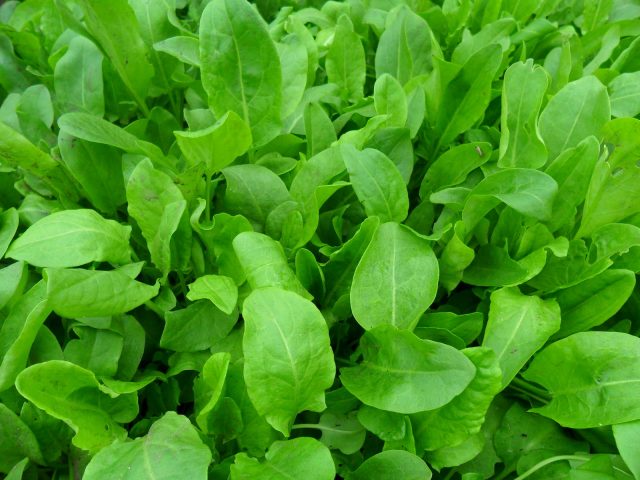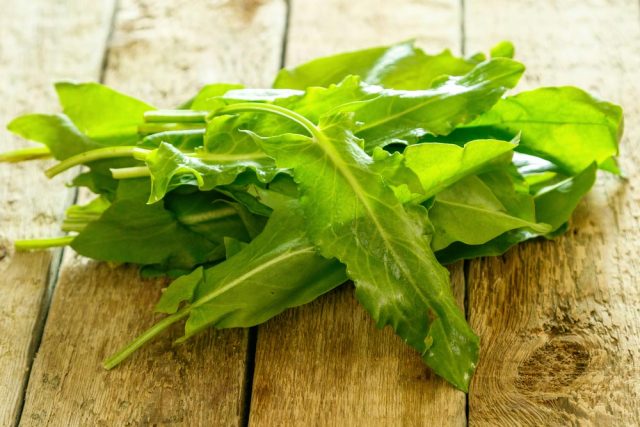Content
Sorrel is a green crop that is widespread in Russia almost everywhere. This type of crop refers to plants whose fresh young leaves are used in their green form for making salads, soups and for canning. Sorrel is a healthy spring product that is included in the menu of both adults and children. Those who are interested in this vegetable will find useful information about the health benefits and harms of sorrel, and how to use it correctly.
Useful properties of sorrel
It, like all greens, is low in protein and carbohydrates, practically no fat, but this is not the point of its usefulness as a food product. In spring, sorrel grows early and becomes one of the first garden crops that can be eaten during this period. At this time, it is just the way - it contains a lot of vitamins and mineral elements, the body desperately needs them after winter.
Fresh sorrel can be not only a vitamin product, but also a medicine. It has many uses in folk medicine. It can be used as an agent that improves and stimulates the digestive processes, as an astringent, anti-inflammatory, analgesic and healing agent, as an antibiotic and antiscorbutic drug.
It can be eaten for:
- prevention of hypovitaminosis, anemia;
- increasing immunity;
- improving digestion;
- elimination of inflammatory processes in the intestine and to restore microflora;
- maintaining muscle tone;
- cleansing blood vessels and increasing their elasticity;
- elimination of accumulated toxins;
- normalization of fat metabolism.
Sorrel broth is used as a choleretic agent, used for the treatment of dyspeptic disorders and skin diseases, allergic rashes. From the root of the plant, agents are prepared for the treatment of liver pathologies, inflammatory diseases of the oral cavity, small wounds and mild burns. A decoction of roots and leaves will help with enterocolitis.
Why sorrel is useful for women
It contains vitamins important for the female body, including ascorbic and folic acids, tocopherols and minerals, iron, calcium and iodine. All of them are necessary for women for the normal functioning of organs and systems, help to maintain their work and maintain youthful tissues.
Thanks to these substances, sorrel helps to recover after menstruation and relieves the condition with menopause, reducing the severity of such symptoms characteristic of this condition as dizziness, hot flashes, sweating, etc.
In addition, sorrel, like all greens, is low in calories, it contains only 22 kcal, so it can be eaten even by women who monitor their weight. It is recommended to use it as a component for home cosmetics, prepare a decoction and use it for washing with skin rashes and for whitening freckles and spots.
Why sorrel is useful for men
The vegetable will also be useful for the health of men. If you use it regularly, it will have the most positive effect on the health of the genitourinary organs, in particular, the prostate gland. This effect is due to the presence of zinc in the plant.Another element, potassium, is essential for the proper functioning of the heart, so a sufficient intake of this element in the body is necessary to prevent cardiovascular disease.
What vitamins are in sorrel
There are very few proteins, fats and carbohydrates in this vegetable garden, as in other herbaceous plants: per 100 g, there are 1.5 g, 0.3 g and 2.9 g, respectively. There are several organic acids - 0.7 g, fiber - 1.2 g and a lot of water - 92 g.
In addition to these substances, green sorrel contains a number of vitamins, especially many compounds from group B (B1, B2, B4, B5, B6 and B9), as well as retinol and beta-carotene, ascorbic acid, alpha-tocopherol, biotin, phylloquinone, nicotinic acid, and niacin. Most of all, the percentage of them in sorrel contains vitamins: A, beta-carotene, B1, C, E and K. There are also plenty of mineral elements - K, Ca, Si, Mg, Na, S, Ph, Cl, Al, B , V, Fe, I, Co, Li, Mn, Cu, Mo, Ni, Rb, Se, Sr, F, Cr and Zn.
The nutritional value of the plant and its benefits lie in vegetable protein, easily digestible carbohydrates, vitamins and many mineral elements rarely found in other crops. All of them enter the body from fresh or canned leaves and are completely absorbed.
Why sorrel is harmful
Fresh or canned leaves of the plant are undoubtedly beneficial to health, but only if consumed in moderation, without exceeding the norm. Otherwise, the harm of sorrel to the body is manifested in the excessive accumulation of organic acids, especially oxalic. They have a negative effect on the stomach, kidneys, duodenum.
Especially dangerous in this respect are old leaves, in which there is more acid than in young ones.
Is sorrel possible for pregnant women
Sorrel during pregnancy in moderate doses is not contraindicated and even useful, first of all, with folic acid and mineral elements. Vitamin B9 is necessary not only for a mother carrying a baby, but also for a child for normal development. Its deficiency during the formation of the fetus does not allow it to develop correctly, the child develops abnormalities, often very serious.
Is it possible for a nursing mother to eat sorrel
Healthy women who have given birth, who are already feeding a child, should not give up sorrel. It enhances the secretion of enzymes by the digestive tract, has a choleretic effect, and works as an antiseptic for food. But the use of sorrel by nursing mothers should be moderate and strictly controlled: if, for example, after it the child has an allergy, it should be immediately removed from the diet. In other cases, sorrel is not contraindicated for breastfeeding.
Doctors recommend using a decoction of the leaves for pregnant women with angina, gingivitis, stomatitis for rinsing the throat and mouth. The broth is recommended for use, since many synthetic sprays are not suitable for women during this period, but natural remedies are allowed.
At what age can sorrel for children
Sorrel should not be given to very young children because of the high acidity, despite all its benefits. Acids irritate the stomach lining, and children do not like acidic foods very much. Therefore, it is not necessary to feed a child with sorrel until the age of 3, it is better to find other products that contain the same nutrients. For children from 3 years old, it is better to give it cooked as part of dishes, and not fresh.
How to use sorrel correctly
The benefits and dangers of sorrel for the human body can be talked about in connection with its correct or incorrect use. It must be remembered that oxalic acid in small doses is important for the body, and in excessive quantities it is often harmful. It has been established that for safe use, you need to eat no more than 10 leaves a day. Sorrel dishes can be consumed no more than 1-2 times a week.
To minimize the negative effects of oxalic acid and its harm, you need to eat vegetable leaves in combination with lactic acid products - sour cream or kefir. For example, adding sour cream to green sorrel leaf soup will not only make it tastier, but also much healthier. This is due to the action of lactic calcium, which binds oxalic acid and prevents it from being absorbed. However, at the same time, it also cannot be assimilated, therefore, other products with this element or synthetic complexes of vitamins and minerals must be present in the diet. This applies not only to the use of fresh leaves, but also canned ones, which are used to make soups in winter.
It is recommended to sprinkle salads from fresh young leaves with lemon juice or, alternatively, apple cider vinegar to neutralize oxalic acid and remove its salts - oxalates.
Contraindications to sorrel
Contraindications to the use of the plant are associated with the same oxalic acid and its harm. It should not be eaten by those people who have been diagnosed with kidney disease, sand and stones in the excretory organs. It is strictly forbidden to use sorrel for gout. Diseases caused by disorders of gastric acid secretion, gastritis and ulcers are also included in the list of contraindications. With inflammatory processes in the digestive organs, pancreatitis, any disorders of water-salt metabolism and diseases that have arisen against their background, arthritis, arthrosis, osteoporosis, the vegetable is also prohibited.
During pregnancy, it is prohibited if a woman has problems with the kidneys, digestive organs, and inflammatory diseases of the genitourinary organs in the chronic stage.
Sorrel with type 2 diabetes can be consumed, there will be no harm from it, but only if there are no other diseases. And since they are often still there, the use of sorrel in type 2 diabetes should take place according to an individual scheme. To do this, you first need to consult a doctor, and then adjust the diet in accordance with his recommendations.
For people who do not have the listed diseases, the vegetable is not harmful and can be contraindicated only if there is an allergy to any component in its composition, although this does not happen often.
Conclusions.
The health benefits and harms of sorrel depend on when, how and how much to consume it. Subject to the rules and regulations of admission, the plant will be useful, if ignored, it can be harmful.











